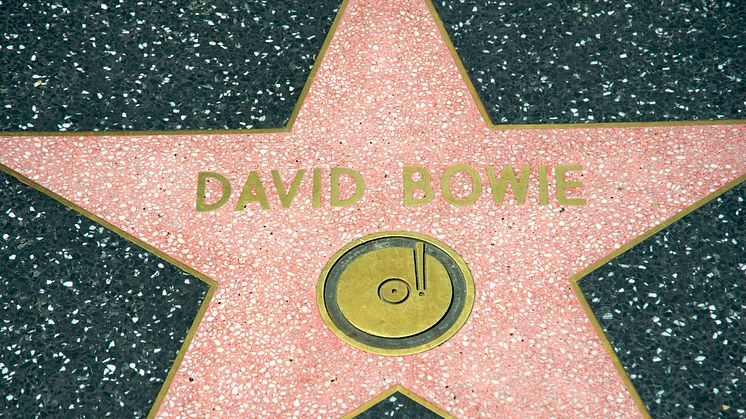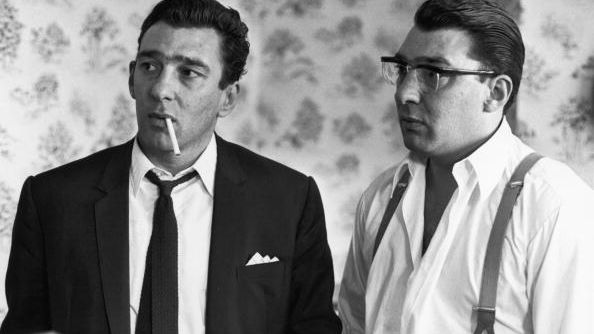
Press release -
COMMENT: Five performances that show Bowie’s acting is worth a second take
Andrew Ross, Graduate Tutor and Lecturer in Film at Northumbria University, discusses David Bowie's career in film for The Conversation.
“I find that I am a person who can take on the guises on different people that I meet … I am a collector, and I always seem to collect personalities”, so remarked David Bowie in a 1973 television interview enquiring into the origin of the Ziggy Stardust persona. Perhaps for a musician with a keen fascination for both theatrical performance and cinema it was always inevitable that his talents and stardom would eventually find expression through film.
Although Bowie’s ground-breaking and transgressive appearances in nascent music videos such as Life on Mars (1973) and Ashes to Ashes (1980) have passed into deservedly celebrated iconography, often his appearances in narrative cinema have been overlooked and even ridiculed. But it’s through Bowie’s career on film that we receive some of his richest and most personal gifts. Here are five key performances that in films (and TV) that add to our understanding of the enigma and allure of this most singular artist.
The Man Who Fell To Earth (1976)
Thomas Jerome Newton - alien explorer lost to the pleasures of hedonism in Nicholas Roeg’s fractured parable of consumer alienation - remains Bowie’s clearest signature role. Referenced on the covers of his own explorations into musical alienation, Station to Station (1976) and Low (1977), a calcified Newton would return in last year’s Broadway sequel Lazarus as “a dying man who can’t die” – a ghost of Bowie’s own mid-70s drug purgatory. If Newton in Lazarus is Bowie’s fever dream of an alternative life without recovery, the original film shows the artist at his most fearful of losing his soul. When the once potent alien is reduced to an anaesthetised couch potato, Bowie’s true terror is revealed: mediocrity.
Merry Christmas Mr Lawrence (1983)
Nagisa Oshima’s gruelling examination of friendship and sacrifice within a Japanese prisoner of war camp was declared by Bowie to contain his most credible performance. Jack “Strafer” Celliers, a recalcitrant officer driven by childhood trauma to strategies of self destruction, transfers the star’s boundary pushing sexual ambivalence into a simmering arena of homoerotic obsession and violence.
Although portraying a Kiwi, Bowie subtly subverts the Great Escape stereotype of a wartime British officer and revisits the sado-masochistic edges of Peter O’Toole’s TE Lawrence in an achingly modern performance which provides in the process a template for Michael Fassbender’s neurotic android David in Ridley Scott’s Prometheus (2012). It may be TE Lawrence which David fixatedly preens his image to reflect but the result – an automaton’s simulacrum of a British stiff upper lip- is explicitly Bowie.
The Hunger (1983)
“Bela Lugosi’s dead” intones the graveyard voice of Bauhaus lead singer Peter Murphy as Tony Scott’s prowling camera reveals preternaturally elegant vampires Catherine Deneuve and David Bowie stalking their prey. Bowie - all black shades and leather - is the definition of Manhattan cool but the film soon perforates the impervious shell of the Thin White Duke, ageing him at an accelerated pace, his youthful virility neutered as line after line carves across his formerly beatific face. The sight of an almost unrecognisably shrivelled Bowie, humbled by the burden of an ancient body, becomes more far more poignant now we realise he is portraying an age Bowie never reached himself.
Labyrinth (1986)
Although Bowie’s reputation as an aesthete might seem at odds with his appearance in such unlikely work as SpongeBob SquarePants and his introduction to The Snowman, his participation in children’s films has often reflected his role of father and revisited the themes of his work in a more fable like manner.
It was therefore at the crest of the commercial wave Bowie found himself on after Lets Dance that the tension between his family-friendly image and his more subversive 1970s personae converged in his most fondly remembered performance.
On paper the story of Bowie’s Goblin King, Jareth, stealing away the baby brother of Jennifer Connelly’s Sarah, only to fall in love with her when she defies him appears to be nothing more than a modern spin on the Beauty and the Beast myth. However Bowie’s knavish performance never lets Jareth appear as a monster but more a seducer from the start. Magnificent of hair and codpiece, he represents a dangerous symbol of the teen girl’s sexual awakening: mercurial, unknowable yet magnetic and playful. In an acting career defined by deliberate left-field choices, it remains Bowie’s most rock-star performance and a telling reminder that this was once the man who shocked Middle England with reptilian allure and perversity as what Jareth clearly wants with Sarah has no place in any children’s’ film.
Extras (2006)
OK so this one is a bit of a television cheat. Barring a brief cameo in Ben Stiller’s fashion model comedy Zoolander (2000), Bowie’s acting work in the late 80s and 90s can be seen as an airless retread of previous themes. His portrayal of Andy Warhol in Julian Schnabel’s Basquiat (1996) as a dry and parasitic older man echoed the previous vampirism of The Hunger, itself a property he returned to in its short lived TV form. And as intriguing as it was to see Bowie convincingly play the authority figure of Pontius Pilate in Martin Scorsese’s The Last Temptation of Christ(1988) – for once punishing the rebel outsider – the true revelation of Bowie’s acting career came when he appeared on Ricky Gervais’ comedy of errors playing a more candid and blunt version of himself.
My abiding memory of Bowie was seeing him play on what would become his last tour – he was not the austere or overly serious man of legend but someone with a keen dry humour and self-deprecating wit. This side of Bowie was captured so perfectly in the scenes where he publicly shames Gervais’ vain Andy Millman through the use of song and it stands as a perfect tribute to an artist whose greatest contribution was often that of surprise.
This article was originally published on The Conversation. Read the original article.
Topics
Categories
Northumbria is a research-rich, business-focused, professional university with a global reputation for academic excellence. To find out more about our courses go to www.northumbria.ac.uk
If you have a media enquiry please contact our Media and Communications team at media.communications@northumbria.ac.uk or call 0191 227 4571.








